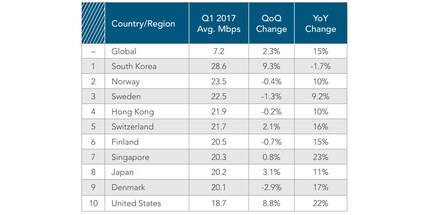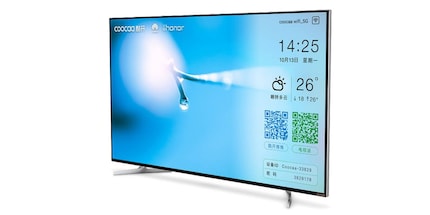
Background information
UHD, 4K and 8K: the true meaning of data transmission
by Luca Fontana

Rumours have it that Huawei is planning to enter the TV market this year: with an 8K TV that has 5G connectivity. What is the smartphone giant intending? Let’s take a look at Huaweis's plans.
Before the year ends, Huawei will have launched the world's first 5G television. At least that’s what sources close to Huawei have reported in the international edition of the Japanese daily Nikkei Asian Review.
What’s it all about? The Chinese smartphone manufacturer is said to be working on an 8K TV. What’s special: it’s equipped with a 5G module that serves as a router for other electronic devices. What’s so special about this is that it could potentially solve the biggest problem with 8K resolution in home cinema: most households have insufficient internet bandwidth.
In other words: even if many movies were available in 8K resolution, the question remains how to get these movies onto home TVs in the streaming age of Netflix, Amazon Prime and the upcoming Disney Plus.
Connecting to the 5G mobile network could change this. What’s exciting about this development is what the 5G-capable 8K television might reveal about Huawei's cross-product strategies.
No TV with a built-in 5G module is yet available; Huawei would be the first manufacturer to take this step and outsmart all other TV manufacturers. According to Swisscom, 5G in Switzerland will make surfing at up to 2 Gbit/s possible initially, with speeds of up to 10 Gbit/s following at a later point. This is between two and ten times faster than current upload and download speeds on the fibre optic network.
Not that fibre optic network wouldn’t allow streaming 8K content – Swisscom claims to have given over 3.95 million homes and offices ultra-fast broadband with more than 50 Mbit/s. That’s just about enough to stream 8K content.
It seems the infrastructure is there, but it’s not always used: According to the state of the internet report published in April 2017 by Akamai, page 14, the average speed Switzerland surfs at is around 21.7 megabits per second. This is enough for UHD, but not for 8K content. Nevertheless, Switzerland ranks 5th in the international speed comparison.

What about globally? The above Akamai report says: The ranking of average surfing speeds shows the US in 10th place with 18.7 megabits per second, Germany in 25th place with 15.3 megabits per second and China in 74th place with 7.6 megabits per second. That’s too few potential viewers for film and series producers to invest in 8K content, which is expensive to produce.
The problem with fibre optic cables is that laying cables is expensive and takes a lot of time – through cities, into the countryside and to remote villages. No so with 5G networks: all it takes is radio antennas to spread internet with great bandwidth via air interface. This is why 5G is regarded as the pioneering technology of the future, in which the so-called Internet of Things – i.e. connecting (household) appliances with the internet – is likely to pave the way for new business models. Need I say more than: Smart Home.
Huawei seems to have recognised this. With the spread of the 5G standard in the next few years, the global average surfing speed is likely to increase massively. This would give Netflix, Disney and Co. more reasons to produce such content. And with a TV that integrates directly into the 5G network, it would be possible to ensure that bandwidth is no obstacle to streaming – although this doesn’t answer the question whether it’s worth having 8K resolution in your home cinema.
So the Chinese smartphone manufacturer probably has the answer to the question of how 8K content will be streamed on home TVs in the future: via 5G network. But why is Huawei, now the second largest mobile phone manufacturer in the world after Samsung, trying so hard to establish a base in the previously unknown TV business?
Switzerland doesn't participate in the development nor the production of 5G network components, so it is dependent on foreign suppliers. Huawei works with Sunrise, while Swisscom purchases the 5G technology from the Swedish company Ericsson. This development doesn’t make everyone happy.

Critical voices fear that network suppliers are installing possibilities to infiltrate the mobile network in their components. In the case of Huawei, the Chinese government is even supposed to be behind this plan. Of course, Huawei has denied this and emphasised their independence from the government.
Either way, Huawei is striving for global supremacy in 5G, which is perceived as a threat by many. But that's not all: in addition to entering the TV business, Huawei also aims to be one of the five largest PC manufacturers in the world by 2021. The Chinese manufacturer has been in the laptop business since the end of 2017 and runs its devices with Intel processor chips. Deliveries are expected to triple this year and Huawei PCs are planned to be equipped with processors developed in-house.

Huawei therefore intends to expand its ecosystem, especially its Smart Home range. This requires a similarly strong brand presence as Samsung or Apple. The Chinese giant hopes to gain enough brand presence to overcome this hurdle by expanding into sectors that are crucial for consumer electronics such as TVs, laptops, notebooks and computers – combined with its already advanced 5G know-how and the already popular smartphone segment.
Only a closed brand ecosystem ensures that buyers of a Huawei smartphone think twice about whether they should buy a household appliance that isn't produced by Huawei. This is a strategy to enforce brand loyalty – one that we know from Samsung and Apple. Will it work for Huawei? We’ll see.
Although the expected 8K 5G TV will be Huawei's first TV, the Chinese company is by no means a complete newcomer to the industry.
The chipsets, for example, are provided by Hisilicon Technologies: the Huawei subsidiary, based in Shenzhen, currently acts as a supplier for well-known brands such as Hisense and Sharp. Huawei will also produce the 5G modem chips in-house. As analysts suspect, however, the 8K displays will come from Samsung. This means, Huawei will probably rely on the LCD-based QLED technology. However, there is no reliable information on this yet.

Despite the seemingly bright future for all fans of 8K resolution, Huawei's entry into the TV industry will not have a major impact in the medium term. Why? The global 5G infrastructure is not there yet. It doesn't help that countries such as the US, Great Britain, Germany, India and Italy have expressed concerns about cooperating with Huawei and other manufacturers. New Zealand has even banned any collaboration with Huawei. On top of this, the Chinese manufacturer relies on the advancement of efficient 8K cameras, television processors, encoders and decoders. The market for this is relatively small, so it's likely to take a few more years.
Huawei won't be too bothered. With its smartphones, the Chinese giant has been proving for years that they have almost infinite money and can afford to be patient. If Huawei's pricing strategy for TVs is as aggressive as that for smartphones, the competition is likely to be in for a tough battle.
I write about technology as if it were cinema, and about films as if they were real life. Between bits and blockbusters, I’m after stories that move people, not just generate clicks. And yes – sometimes I listen to film scores louder than I probably should.
Interesting facts about products, behind-the-scenes looks at manufacturers and deep-dives on interesting people.
Show all